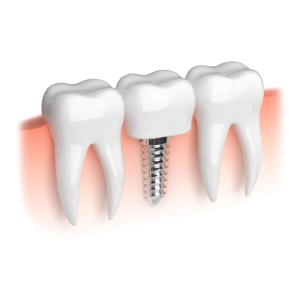Request Appointment
Kissimmee

New Patients Only: (407) 635-1196

All Other Callers: (407) 932-2273
Saturday By Appointment
Schedule Now

Call Us
Call Us Now

Dental implants are one of the most trusted solutions for replacing missing teeth. But like any medical procedure, they aren’t without risks. When things don’t go as planned, implant complications can arise, causing discomfort, bone loss, or restoration failure. If you’re facing issues with your dental implants, Parkway Dental Care in Kissimmee, FL, is here to help with advanced solutions for implant repair or replacement.
In this guide, we’ll explore how to identify a failing dental implant, what causes implant issues, your treatment options, and what to expect from our experienced team.

Dental implants consist of three parts:
When placed correctly and cared for properly, dental implants can last decades. Parkway Dental Care uses 3D imaging and precise treatment planning to ensure high success rates.
Implant complications can occur early (within weeks) or late (months or years later). Some of the most common causes include:
Our Parkway Dental team performs thorough diagnostics using advanced tools to determine the root cause before recommending a solution.
Not every discomfort means your implant fails, but persistent symptoms should be evaluated. Warning signs include:
If you notice any of these symptoms, call Parkway Dental Care at (407) 635-1196 for an evaluation.
At Parkway Dental Care in Kissimmee, FL, we understand that implant issues, though rare, can be stressful and frustrating. Whether the problem is minor or more serious, our experienced team offers a range of advanced treatment options to help restore your smile and protect your oral health.
Here’s how we customize treatment to restore failed or compromised dental implants based on your specific condition:
If the titanium implant post is still firmly integrated in your jawbone, but the problem lies with the attached crown, abutment, or screw, we can often correct the issue without surgery. These repairs may include:
This is typically a quick, noninvasive, and cost-effective solution that restores function and aesthetics without requiring the implant to be removed.
If you’re experiencing redness, swelling, bleeding, or discomfort around your implant, you may have peri-implantitis, an infection affecting the surrounding gum and bone. Early treatment is critical to saving the implant. Our treatment approach may involve:
When caught early, peri-implantitis is highly treatable, and we can often preserve the implant without removal.
Removal may be necessary if the implant has failed due to bone loss, chronic infection, or mobility. Our process involves:
Thanks to our use of advanced digital technology and planning tools, Parkway Dental Care's implant replacement is efficient and highly predictable.
In some cases, such as when significant bone loss has occurred or a patient’s overall health prevents another implant surgery, we offer customized restorative alternatives, including:
A fixed dental bridge is a restoration that fills the gap created by one or more missing teeth. It relies on adjacent healthy teeth for support, which are reshaped to hold the bridge securely in place for long-term stability.
Partial or complete dentures are custom-made prosthetics that replace missing teeth. Designed to fit comfortably in the mouth, they restore function and appearance while ensuring stability, comfort, and ease of use, with minimal irritation to the gums.
Implant-supported dentures are prosthetic devices anchored by dental implants rather than relying solely on natural teeth or gums. They provide a stable, secure fit by using any remaining healthy implants, offering improved comfort and function compared to traditional dentures.
We’ll work closely with you to select the best solution that supports chewing function, speech, and smile confidence.
Dental implants boast an impressive success rate of over 95%, but like any medical procedure, they can come with certain risks or side effects. Being informed helps you monitor healing and know when to seek help.
Common Post-Placement Effects (Short-Term):
Less Common Risks (Long-Term):
If you’re experiencing discomfort, instability, or other complications with your dental implant, don’t wait. The earlier you address the issue, the better your chances of preserving your smile.
At Parkway Dental Care, we combine experience, technology, and compassion to restore your oral health. Whether you need a minor adjustment or a full implant replacement, our Kissimmee team is ready to help.
Call us at (407) 635-1196 or visit 1064 E Osceola Parkway, Kissimmee, FL 34744 to schedule your implant evaluation today.
It depends on the cause. If only the crown is loose, it’s a simple fix. But if the implant post is moving, it may need removal and replacement.
The process can take several months, especially if bone grafting is required. Your dentist will create a personalized timeline.
Coverage varies. Parkway Dental is in-network with many providers, and we’ll help you verify and maximize your benefits.
Most repairs are minimally invasive and performed under local anesthesia. Discomfort is usually mild and manageable with medication.
We offer alternative restorations like bridges or implant-supported dentures to restore your smile effectively.